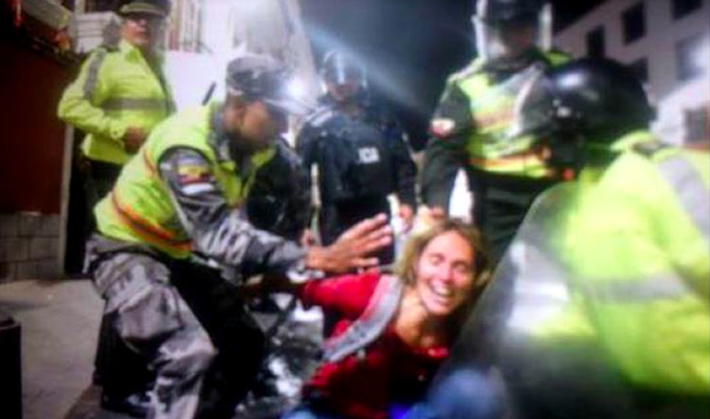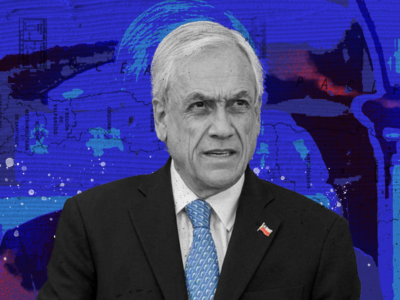
Screen capture that shows police forcefully arresting Franco-Brazilian journalist Manuela Picq, August 13.
Detained, beaten-up and threatened with deportation: Franco-Brazilian journalist Manuela Picq experienced the rough edges of Ecuador's political system after attending an anti-government rally this month backed by union bosses and indigenous leaders.
Although an Ecuadorian judge last week rejected the authorities’ request to deport Picq, sending it back to the Ministry of Interior for re-consideration, Picq elected to leave the country, pledging to return and fight her case at a later date.
Outrageously, the government claimed Picq's visa had long ago expired, implying she was staying in the country illegally:
La certificación de movimientos migratorios indica que Manuela Picq registra el ingreso al país, el 26 de febrero del 2012, con una visa 12 VIII, y un plazo de 180 días para su permanencia. La visa que la ciudadana extranjera mantenía actualmente se encuentra revocada por parte del Ministerio de Relaciones Exteriores.
The migratory flows certification shows that Manuela Picq entered the country on February 26, 2012, with a visa 12 VIII with a stay period of 180 days. The visa that the foreign citizen had has been revoked by the Ministry of External Affairs.
The official report of Manuela Picq's arrest on the Ecuadorian Ministry of Interior webpage states the journalist was being assaulted by unknown people when the national police came to her aid and gave her medical and psychological assistance.
The newspaper El Comercio shared a video in which the detention downtown in the national capital Quito can be clearly seen:
Picq — an academic and regular contributor to Al Jazeera — was subsequently taken to Hospital Eugenio Espejo. At 11 pm local time 50 police officers arrived outside the emergency ward.
Among the police officers, there were some carrying anti-riot oarlocks and shields, the newspaper El Comercio reported.
In the video below, filmed by police, Picq explains that she received assistance from the National Police and the Ministry of Public Health and at no point reveals any attack.
The following day, however, Picq wrote on her Facebook page that her visa had been cancelled.
The journalist, who has been living in Ecuador for eight years, alleged police violence in an interview with the newspaper El Comercio:
Mi visa caduca el 28 de este mes y es anual, que se renueva cada año. Es un documento totalmente legal, vigente que fue cancelado de forma arbitraria y abrupta esta mañana. Ayer, yo no estuve ilegal y me arrestaron sin ninguna razón, nunca me detuvieron con motivos… En lo humano, lo que siento es una mezcla de varias cosas. Me dieron un toletazo en la cara; perdí la visión del ojo izquierdo por varias horas ayer noche, por suerte estoy bien. Me golpearon duro, me trataron como criminal solo por caminar en las calles.
My visa expires on the 28th of this month and it is renewed on an annual basis. It is certainly a legal and valid document that was cancelled arbitrarily and abruptly this morning. Yesterday, I was not staying illegally and I was arrested without any reason, there were no causes for my detention…As a human being, I feel a mixture of many things; I received a strike with a gun to my face, I lost my left eye vision for several hours last night, thankfully I'm OK. I was beaten up badly, I was treated like a criminal only for walking the streets.
Her case promptly reached the crowdsourcing petitioner Change.org under the headline Stop the Deportation of Manuela Picq.
The letter, which raises alarm over the violent treatment accorded to Picq, is addressed to President Rafael Correa and has gathered more than 8,000 signatures.
On the blog Periodismo de las Américas, Natalia Mazotte wrote:
La hostilidad hacia los periodistas, medios de comunicación y activistas se ha incrementado en Ecuador, y los ataques a la libertad de expresión son cada vez más frecuentes. La ONG Fundamedios en su informe ‘Víctimas del clima de hostilidad en Ecuador’ mostró un aumento en los ataques contra la prensa y activistas”.
Hostility to journalists, the media and activists has increased in Ecuador, and attacks on freedom of expression are becoming more frequent. The NGO Fundamedios, in its report Victims of the Hostile Climate in Ecuador demonstrates an increase in attacks on the media.
Picq's problems may have come about due to her relationship with a prominent indigenous leader present at the protest, Carlos Pérez Guartambel.
Guartambel leads the Confederation of Peoples of Kichwa of Ecuador (Ecuarunari) and is also Picq's life partner. Ecuarunari is affiliated to a broader indigenous movement represented by the Confederation of the Indigenous Nationalities of Ecuador (Conaie), that backed workers’ calls for the protest.
The indigenous leader, who has inflamed the government by leading opposition towards several mining projects, told journalists that what had happened to Picq was part of a concerted government campaign of threats and intimidation against him and his organisation.
The rally saw more than 70 persons arrested throughout the country.
Manuela Picq has since announced that she will try to obtain a visa to return to Ecuador and that she will file a law suit against the government before the Inter-American Court of Human Rights to investigate the crime of violation of constitutional rights and migration.







3 comments
She was taken to the hospital by 2 police officers. The “50” number that gets thrown around was put out there by her boyfriend, a man who also claimed he had his jaw broken by police that same night despite hundreds of photos and videos showing that he was unscratched and he was giving interviews and kissing Manuela on television, grinning from ear to ear, just 48 hours later. I know love cures all, but a broken jaw? Riot police did arrive at the hospital later that evening when protesters invaded the hospital with the stated goal of “freeing” Manuela, but she was long gone by then.
It’s amazing how much misinformation on this event is being reported in the English-language press. It’s so inaccurate one has to wonder if any English-language outlet bothered to send a reporter or if they’re just taking the word of confirmed liars at face value.